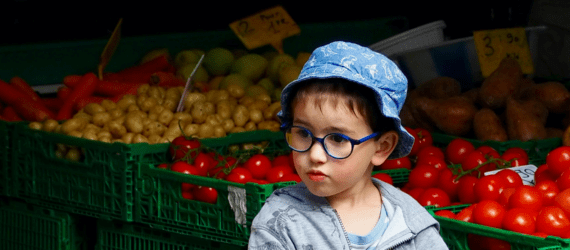The U.S. farm bill is a consistent priority for Bread for the World because it contains so many policies and programs that affect people living with hunger. The farm bill is renewed for five years at a time, and Congress is currently debating various proposals for the 2023 bill.
Bread wasted no time in endorsing the farm bill priorities of the Zero Food Waste Coalition, which align with our own. Bread members identified food waste as an important issue in listening sessions held before Bread’s farm bill platform was drafted, and reducing food waste is a key component of the platform.
Nearly 40 percent of the food produced in the United States goes to waste. “So much of the fresh produce grown on America’s farms never make it to market, often due to small blemishes that don’t diminish its nutritional content one bit,” said Reverend Eugene Cho, President/CEO of Bread for the World, in his endorsement of the coalition’s priorities. “That’s why Bread endorses the Zero Food Waste Coalition’s call for the 2023 farm bill to support food recovery organizations.”
The Zero Food Waste Coalition is led by the Food Law and Policy Clinic at Harvard; two national environmental advocacy organizations, the Natural Resources Defense Council and World Wildlife Fund; and ReFED, the go-to source for data on food waste and evidence-based ways to reduce it.
In addition to supporting food recovery, the coalition’s main priorities for the farm bill include:
- Creating a food loss and waste reduction office within the U.S. Department of Agriculture (USDA) and authorizing it to offer grants for projects to reduce food waste.
- Increasing funding for planning and infrastructure to reduce food waste and enhance food recovery.
- Funding research in food waste prevention, upcycling, and recycling solutions.
- Standardizing and clarifying date labels.
The 2018 farm bill authorized one staff position to coordinate activities at USDA aimed at reducing food waste, supporting federal efforts to fulfill the pledge, made in 2015, to cut food waste in half by 2030. According to ReFED’s latest analysis, there has been little progress toward this goal. Cutting food waste in half will take more than one staff member working to coordinate USDA efforts. At a minimum, it calls for a coordinated federal plan and activities as well as staff who can support the work of state and local governments, Tribal governments, nonprofits, and the private sector.
Much can be done to improve the infrastructure necessary to reduce food waste, and the country already has a solid network of people trained in equipping others to implement cost-effective solutions. One of many examples is a program known as SNAP-ed that is offered to people who participate in the Supplemental Nutrition Assistance Program (SNAP). SNAP-ed demonstrates potential ways of stretching grocery budgets to enable the purchase of more healthy foods. SNAP-ed is not currently required to teach strategies for avoiding food loss and waste, but since both SNAP and SNAP-ed are part of the farm bill, it would be straightforward to change the rules.
Most food waste in the United States occurs on the consumer end. The average U.S. household wastes more than $1,800 worth of food every year. One reason is confusion about “best by,” “use by,” and other dates on food labels—confusion that is completely understandable since the labels are not standardized. Requiring food labels to include clearer information would help people use more of the food they have purchased.
Households that participate in SNAP have limited grocery budgets and need to consume the healthy food they have purchased. The “average” $1,800 in food waste would be months of SNAP benefits for most families. SNAP-ed could provide information on food labels that people can put to use right away.
We recently wrote about the significant potential to mitigate climate change by reducing food loss and waste. Climate change poses one of the gravest threats to ending global hunger, so reducing food waste is important to our advocacy to end global and U.S. hunger. Although the United States is the cause of more food waste than nearly any other country, cutting food waste in half is an achievable goal, and the Zero Food Waste Coalition’s priorities should be included in the farm bill.
Todd Post is senior domestic policy advisor, Policy and Research Institute, with Bread for the World.



